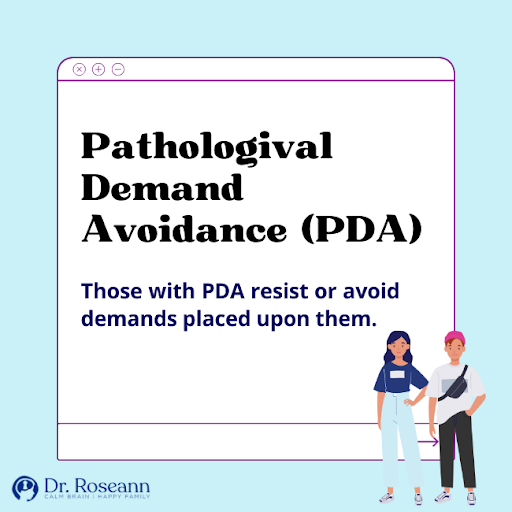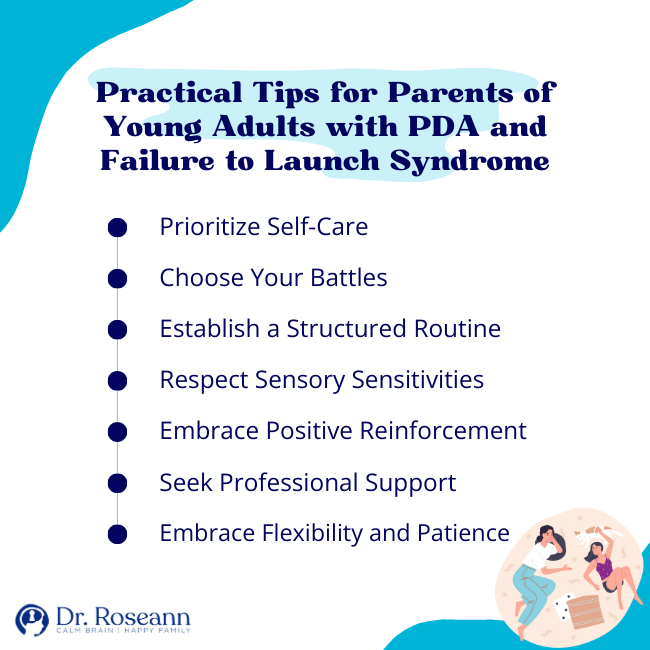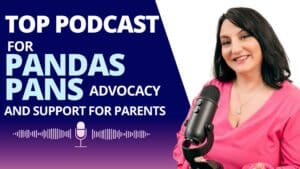Failure to Launch Syndrome is when young adults struggle to transition successfully into independent, adult life. They're stuck in a never-ending loop of stuckness where they refuse to leave the comfort of their childhood nest. On the other hand, Pathological Demand Avoidance, or PDA, is a profile that is often thought of as a part of the autism spectrum.
Avoiding tasks is a central component of PDA. PDA is also referred to as extreme demand avoidance. Parents typically complain of extreme low motivation.
I worked with a young woman named Linda who was grappling with the challenges of low motivation and resistance to just about every task that she wasn’t interested in Her parents, though frustrated, were determined to find a way to support her and help her navigate the complexities of daily life. Her parents had explored various avenues, including therapy and medication, but were also searching for alternatives aligned with Linda's needs.
The Challenges Faced by Young Adults with PDA Profile and Failure to Launch Syndrome
During young adulthood, dreams are born, and the world is your oyster. But for young adults with the perplexing combination of PDA and Failure to Launch Syndrome, this stage of life can resemble more of a labyrinth than an open playground of possibilities. The everyday demands of the adult world become towering obstacles, seemingly designed to trigger panic attacks and send their nerves into a tailspin.
Imagine Linda struggling with the weight of social situations. It's as if she's handed a script for a play she never auditioned for. With her PDA profile or perhaps an autism spectrum disorder diagnosis, she fumbles to navigate the intricacies of social communication, and it becomes a monumental task. Social norms? More like a tangled web of invisible rules that are forever out of reach. And those authority figures? In her mind, they're like mythical creatures with ever-changing expectations.
Now, let's add-in Failure to Launch Syndrome. Linda finds herself standing at the brink of adulthood, peering into a world that appears to be on fast-forward. For her, the ordinary demands of life that most people take in stride become insurmountable hurdles. Adult responsibilities loom large, like towering mountains waiting to be climbed. But the path forward feels obscured, leaving her feeling lost and overwhelmed.
Now this isn't just a case of a little girl or boy having a bad day but an intricate pattern of behavior that stretches to an extreme extent. These young adults may also exhibit symptoms of oppositional defiant disorder, resisting the very notion of adult life with every fiber of their being. And, when their mental health declines, mood disorders like anxiety or depression may become unwelcome companions on this treacherous journey.
The outside world can often be unforgiving and unaccommodating, adding to their challenge. Social media bombards them with images of seemingly perfect lives, further amplifying feelings of inadequacy. Economic changes create a shifting landscape where the path to success seems more elusive. It's enough to make even the most resilient souls question their worth and capabilities.
Identifying the Symptoms of PDA in Young Adults

One of the critical aspects of PDA is the pattern of behavior exhibited by the young adult. They possess an uncanny ability to resist or avoid demands placed upon them as if they have a secret arsenal of evasion tactics. These behaviors may extend to a point where they differ significantly from what one might consider a typical response to external demands (O'Nions et al., 2017).
For instance, you may notice that your young adult demonstrates symptoms akin to Oppositional Defiant Disorder. They may argue vehemently with authority figures, challenging every rule and request.
It's as if the mere mention of adult responsibilities sends them into a battle-ready stance, prepared to defend their autonomy at all costs. It can frustrate parents as we try to guide them toward a more independent life.
In social communication, young adults with PDA often face extraordinary challenges. Their ability to navigate social situations may be hindered by difficulties understanding and adhering to social norms (Trundle et al., 2017).
It's like watching them tackle a complex puzzle without the instruction manual, leaving them feeling bewildered and out of place. Nonverbal communication may also present hurdles, making it harder for them to pick up on subtle cues and gestures.
Now, let's not forget the impact of sensory issues on their everyday lives. These young adults may find themselves overwhelmed by the ordinary demands of life, which can lead to increased anxiety and even panic attacks.
The nervous system becomes a fragile balance, teetering on the edge as they navigate a world that can be harsh and unforgiving. Sensory sensitivities may range from a heightened response to specific sounds or textures to struggling with changes in routine or environments.
As parents, it's vital to recognize that these symptoms and behaviors are not mere quirks or tantrums. They are the manifestation of a complex set of challenges that these young adults face.
Building Social Skills for Young People with PDA Behaviors
For young people with a unique PDA profile of autism, building social skills can feel like embarking on a grand adventure through an unknown landscape. But one effective strategy for fostering social skills is through the power of role-play.
Take on different characters, act out scenarios, and encourage your young adult to step into the shoes of others. Through this playful exercise, they can develop empathy, perspective-taking, and a deeper understanding of social dynamics.
However, let's remember the importance of real-life interactions. Encourage young adults to participate in social activities or join organizations that align with their interests. These opportunities allow them to engage in shared experiences, practice social skills in a supportive environment, and forge connections with peers.
Whether it's joining a sports team, volunteering for a cause they believe in, or pursuing creative endeavors, these real-world interactions lay the groundwork for building meaningful relationships.
Practical Tips for Parents of Young Adults with PDA and Failure to Launch Syndrome

Navigating the complexities of our son's or daughter's unique needs and challenges can be like traversing a treacherous terrain if they have PDA and Failure to Launch Syndrome. As parents, we must equip ourselves with practical tips to guide them in their journey.
1. Prioritize Self-Care
Remember that caring for yourself is essential when serving as an effective support system. Engage in activities that bring you joy. Seek support from friends and support groups and make self-care a routine.
2. Choose Your Battles
Understand that PDA behaviors are not personal attacks. Instead of engaging in power struggles, focus on open communication and finding alternative ways to convey expectations and negotiate compromises.
3. Establish a Structured Routine
Create a schedule that includes regular routines, such as mealtimes, sleep routines, and designated times for work or leisure. Consistency provides stability and helps young adults navigate their day-to-day activities.
4. Respect Sensory Sensitivities
Recognize and respect their sensory sensitivities. Create a calm and soothing environment at home, allowing them to control their sensory experiences. Provide options for noise-canceling headphones, soft lighting, or comfortable clothing that accommodates their needs.
5. Embrace Positive Reinforcement
Celebrate accomplishments, no matter how small. Focus on their strengths and progress to build confidence and resilience. Offer praise, rewards, or incentives to reinforce desired behaviors and milestones.
6. Seek Professional Support
Consult with professionals specializing in PDA, Failure to Launch Syndrome, or related conditions. They can offer guidance, strategies, and interventions tailored to your young adult's needs. Remember, you don't have to navigate this journey alone.
7. Embrace Flexibility and Patience
Understand that some days will be more challenging than others. Be flexible and patient, allowing them space and understanding during difficult times. Trust that progress may come in small steps and that they are on their unique path of growth and development.
Advocating for the Needs of Young Adults with PDA
Parents of young adults with PDA and failure to launch syndrome must look towards the future and advocate for their unique needs. By advocating for their rights and ensuring they have the necessary support, you can help pave the way for their success and well-being.
One study on PDA asked 42 parents of children with this mental health condition to answer questions about their child's education. The parents' answers showed that these children often have a lot of challenges in school. They may display behaviors that make it difficult for them to learn and participate in class. Because of these challenges, they often need extra help and support in school. Teachers and other professionals are involved in helping them succeed. (Gore Langton & Frederickson, 2015).
So, you must continuously educate yourself about PDA and Failure to Launch Syndrome, their characteristics, and their challenges. Stay up to date with current research, resources, and best practices. The more knowledgeable you are, the better equipped you'll be to advocate effectively.
Connect with local or online support groups specifically geared towards neurodiversity. Engaging with other parents and caregivers can provide valuable insights, practical tips, and emotional support. These groups can also be excellent platforms for advocating collectively.
As you collaborate with professionals, such as clinical psychologists, educators, and mental health providers, who specialize in these conditions, you form partnerships based on mutual respect and a shared goal of supporting young adults.
Establish open lines of communication with your young adult's educational institutions. Share information about their mental health condition, its impact on learning and social interactions, and the accommodations necessary for their success. Work with educators and support staff to develop Individualized Education Programs (IEPs) or 504 plans tailored to their needs.
Understand your son or daughter's legal rights and familiarize yourself with the protections available to them as individuals with disabilities. Learn about relevant laws and regulations that ensure equal access to education, employment, housing, and healthcare. Advocate for your young adult's rights within these systems.
Lastly, encourage independence and self-advocacy. Empower your young adult to advocate for themselves. Teach them self-advocacy skills, such as articulating their needs, requesting accommodations, and navigating social situations. Foster their independence and encourage them to participate in decision-making processes actively.
Natural Solutions to PDA and Failure to Launch Syndrome
Aside from the necessary interventions,including individual and family therapy,indiv including natural solutions have helped Linda greatly in her journey. Her daily life became much more manageable as she discovered the power of neurofeedback, PEMF (Pulsed Electromagnetic Field) therapy, and magnesium supplementation.
Neurofeedback, a non-invasive technique, caught their attention because it targets the brain's neural pathways and helps regulate brainwave activity. Linda began neurofeedback sessions, and over time, she experienced improvements in her attention, focus, and emotional regulation. It allowed her to manage her high level of anxiety better and navigate social situations more easily.
In addition to neurofeedback, she also explored the benefits of PEMF therapy. This innovative approach uses low-frequency electromagnetic fields to stimulate cellular activity and promote well-being. Linda found that PEMF therapy reduced her stress levels and improved her quality of sleep, which in turn enhanced her mood and ability to cope with everyday demands.
Recognizing the role of nutrition in brain health, Linda also began taking magnesium supplements. Magnesium is known to support the nervous system and promote relaxation. Linda experienced a noticeable reduction in anxiety and irritability, enabling her to engage more effectively in social interactions and tackle new challenges. All these are included in our BrainBehaviorResetTM Program.
This journey may be tough on parents, but it's also a remarkable opportunity for growth and development. Understanding and embracing young adults' challenges with PDA and Failure to Launch Syndrome can create a path toward independence and a fulfilling life. Remember, progress may come in small steps, but each step brings us closer to unlocking their potential and allowing them to soar.
Parent Action Steps
☐ Learn about Failure to Launch Syndrome and Pathological Demand Avoidance.
☐ Consult with a mental health specialist for the right diagnosis and guidance.
☐ Create a safe space for your child to express their thoughts and emotions.
☐ Engage your child in activities that promote social interaction.
☐ Understand your child's abilities and progress at their own pace.
☐ Establish a daily routine with clear expectations and responsibilities.
☐ Consider neurofeedback, PEMF therapy, and magnesium supplementation.
☐ Advocate for your child's needs and work with their school for support.
☐ Connect with PDA societies and parent support groups for insights.
☐ Care for yourself and prioritize your well-being.
☐ Take our Solutions Matcher to get personalized support for your child
☐ Download the 147 Therapist-Endorsed Self-Regulation Strategies for Children
Citations
Gore Langton, E., & Frederickson, N. (2015). Mapping the educational experiences of children with pathological demand avoidance. Journal of Research in Special Educational Needs, 16(4), 254–263. https://doi.org/10.1111/1471-3802.12081
O’Nions, E., Viding, E., Floyd, C., Quinlan, E., Pidgeon, C., Gould, J., & Happé, F. (2017). Dimensions of difficulty in children reported to have an autism spectrum diagnosis and features of extreme/“pathological” demand avoidance. Child and Adolescent Mental Health, 23(3), 220–227. https://doi.org/10.1111/camh.12242
Trundle, G., Craig, L. A., & Stringer, I. (2017). Differentiating between pathological demand avoidance and antisocial personality disorder: a case study. Journal of Intellectual Disabilities and Offending Behaviour, 8(1), 13–27. https://doi.org/10.1108/jidob-07-2016-0013
Always remember… “Calm Brain, Happy Family™”
Disclaimer: This article is not intended to give health advice and it is recommended to consult with a physician before beginning any new wellness regime. *The effectiveness of diagnosis and treatment vary by patient and condition. Dr. Roseann Capanna-Hodge, LLC does not guarantee certain results.
Are you looking for SOLUTIONS for your struggling child or teen?
Dr. Roseann and her team are all about science-backed solutions, so you are in the right place!
Find out more about Dr. Roseann’s first-of-its-kind supplement line, Neurotastic™ Multi-Mag Brain™ Formula to address anxiety symptoms
Empower yourself with natural solutions for your child's mental health and behavior. Download our FREE quick start guide and start supporting your child today.
You can get her books for parents and professionals, including: It’s Gonna Be OK™: Proven Ways to Improve Your Child’s Mental Health, Teletherapy Toolkit™ and Brain Under Attack: A Resource For Parents and Caregivers of Children With PANS, PANDAS, and Autoimmune Encephalopathy.
If you are a business or organization that needs proactive guidance to support employee mental health or an organization looking for a brand representative, check out Dr. Roseann’s professional speaking page to see how we can work together.
Dr. Roseann is a Children’s Mental Health Expert and Therapist who has been featured in/on hundreds of media outlets including, CBS, NBC, FOX News, PIX11 NYC, The New York Times, The Washington Post, Business Insider, USA Today, CNET, Marth Stewart, and PARENTS. FORBES called her, “A thought leader in children’s mental health.”

She is the founder and director of The Global Institute of Children’s Mental Health and Dr. Roseann Capanna-Hodge, LLC. Dr. Roseann is a Board Certified Neurofeedback (BCN) Practitioner, a Board Member of the Northeast Region Biofeedback Society (NRBS), Certified Integrative Mental Health Professional (CIMHP) and an Amen Clinic Certified Brain Health Coach. She is also a member of The International Lyme Disease and Associated Disease Society (ILADS), The American Psychological Association (APA), Anxiety and Depression Association of America (ADAA) National Association of School Psychologists (NASP), International OCD Foundation (IOCDF) International Society for Neurofeedback and Research (ISNR) and The Association of Applied Psychophysiology and Biofeedback (AAPB).
© Roseann-Capanna-Hodge, LLC 2023










